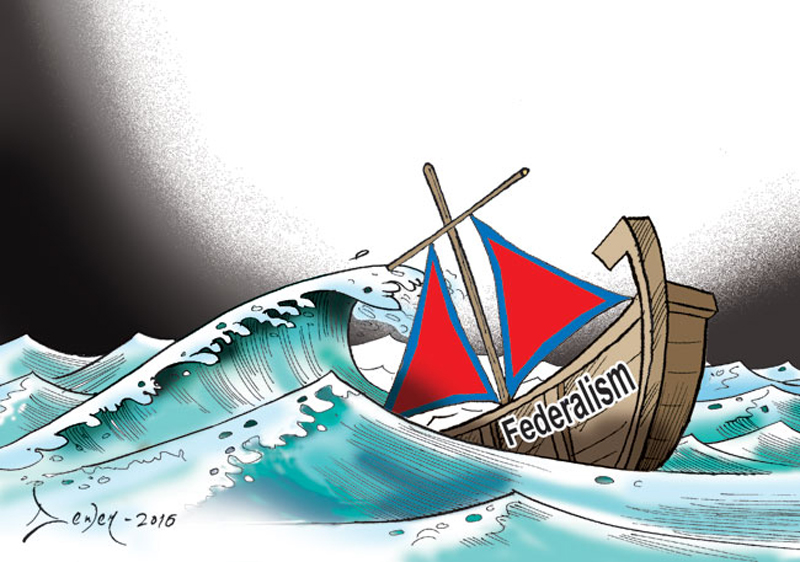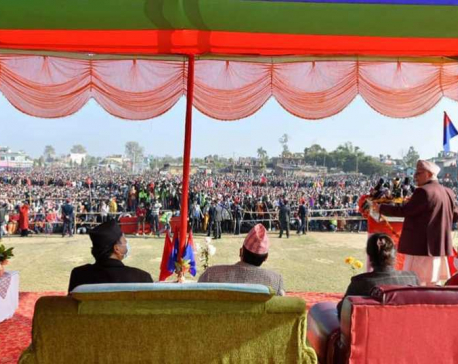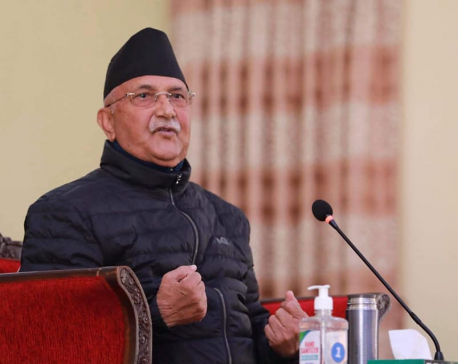
OR

More from Author
How well a federal system functions depends on how well the leaders manage the system.
The government system of Nepal comprises a federal government, seven provincial governments and 753 local governments. Ever since the promulgation of the new constitution in 2015, these spheres of government are in functional state.
Federalism was a contested issue from the very beginning. Many people argued that Nepal, a small nation with a weak economy, won’t be able to sustain the federal system economically and in terms of infrastructure. Others argued that federalism helps sustain the democratic system. Five years into the new system, federalism was slowly getting institutionalized and people had started to feel that federal system can be maintained and made functional.
However, the unconstitutional move of Prime Minister K P Sharma Oli to dissolve the House of Representatives on December 20 has raised fresh concerns that it could ultimately kill federal system itself. It should be noted that federalism is not to be blamed for what the PM did. He dissolved the parliament because he failed to put his party in order. Factionalism was rife within Nepal Communist Party (NCP). Top NCP leaders, including the PM himself, were in blame game for a long time, while caring little about addressing the Covid-19 crisis and its effects in health and economy. How can a leader, or a group of leaders, put the whole system in danger simply because they are not able to resolve the differences within the party?
PM Oli’s move could prove to be a final nail in the coffin of our political system because of following reasons. First, the Prime Minister Oli has already dissolved the House but he has appointed the ministers again. The federal constitution of the country does not allow him to do so. Besides, if the Supreme Court endorses this decision, the country will remain parliament-less for many months.
Two, China and India are competing to expand their influence in Nepal, putting Nepal into a trap between the two regional powers. With the questionable legality of the government after the parliament dissolution, great powers will find a room to maneuver for having greater say in internal politics.
Federalism itself is not the problem. Federal countries with functioning governments have done much better in developments and governance. In countries where provincial governments have been given reasonable autonomy, provincial governments help sustain the system even if the federal government fails.
One big mistake Nepali leaders made in the past five years is that they all focused on raising the amount of salaries and allowances for the lawmakers in the federal and provincial parliaments instead of making the federalism sustainable and functional. If federalism was to be pushed to today’s uncertain situation, why did we have to spend so much money to create several parliaments?
Like Nepal, the United States, India, Brazil, Mexico, Russia, Germany, Canada, Switzerland, Argentina, Nigeria, and Australia have the federal government system. They have maintained high development records. Like Nepal, Switzerland is also a small country but it is a successful federal country. Thus how well a federal system functions depends on how well the leaders manage the system.
In Switzerland, for example, federal government oversees matters related to foreign policy, security and defense. Each canton is independent to take decisions. In Nepal, federal government tended to dictate the terms on provincial and local governments. Power play at the center affected provincial and local governments.
Nepali leaders have been best at creating anarchy and instability in the country. I have a fear that they will take the country back to unitary state from federalism.
You May Like This

I am not against federalism, republicanism: PM Oli
DHANGADHI, Jan 8: Prime Minister KP Sharma Oli on Friday said that he is not against federalism and republicanism. ... Read More...

Is PM Oli taking the country back to dictatorship?
Dissolution of the parliament itself is not a dictatorial move if there is a reasonable reason. ... Read More...

Federalism: learning by doing
Issues have emerged regarding effective implementation of federalism. But there is a long way to go and these issues can... Read More...







Just In
- NRB to provide collateral-free loans to foreign employment seekers
- NEB to publish Grade 12 results next week
- Body handover begins; Relatives remain dissatisfied with insurance, compensation amount
- NC defers its plan to join Koshi govt
- NRB to review microfinance loan interest rate
- 134 dead in floods and landslides since onset of monsoon this year
- Mahakali Irrigation Project sees only 22 percent physical progress in 18 years
- Singapore now holds world's most powerful passport; Nepal stays at 98th












Leave A Comment